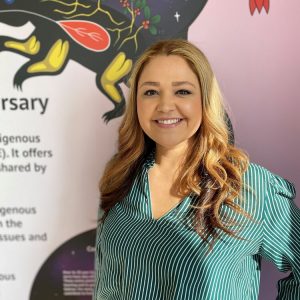This is a re-post from Redefining Traditional in acknowledgement of Orange Shirt Day, a day to honour the lives of children impacted by the residential school system and its continued effect in Indigenous communities across the country. Our Design Researcher at the Innovation Hub, Heather Watts, has shared a thoughtful piece on the significance of this day – one that every individual should deeply reflect on. We also recognize that our learning about and with Indigenous folx and histories does not and should not be located only on specific days, and should be ongoing.

Last year around this time, I wrote the following post on my Facebook page:
A lot of feelings as I dropped Nico off this morning, sporting his orange shirt. Today is Orange Shirt Day, a day designed to educate people and promote awareness about the Indian residential school system and the impact this system had on Indigenous communities for more than a century in Canada, and still does today.
This system was assimilation and erasure packaged and tied as ‘education’. What do we mean when we use this word? What are we teaching? What are we intentionally leaving out? What narrative are we working to maintain?
As I walked my little love to his school here in Toronto, I reflect, what narrative continues to be the one that is upheld? What constitutes knowledge? Who is taught about and in what way are they remembered, revered, and celebrated?
Let us not just be performative on this day, or any day for that matter. Beyond shirts. Beyond land acknowledgements. Let us be critical. Let us be systemic and institutional change agents.
Over the past twelve months since I posted these words, I have engaged in the topic of Reconciliation on a scholarly level, as well as on a personal level. As an Indigenous woman with family members who are residential school survivors, there is a lot to consider when it comes to this journey of Reconciliation. I still very much believe that there is a dominant narrative that our institutions of learning work to maintain, and in large part, that narrative omits, marginalizes, and misrepresents Black, Indigenous and People of Colour (BIPOC).
What 2020 Heather would say to 2019 Heather is that we all have levers in which we can pull when it comes to being change agents; when it comes to the disruption of that very narrow narrative, that is not representative of the incredibly diverse population of these lands. Let us not put the onus on someone else (teachers, principals, superintendents, politicians, librarians) to engage our children in this work. Let us each recognize that we have the agency to seek out resources, to listen, to engage with others in order to unlearn and relearn the history of the lands we walk on. Let’s not stop there. Let’s not frame Indigenous folks, BIPOC folks through the lens of history. We are very much still here. Let’s not frame BIPOC through a lens of deficit, through a lens of colonization being ‘done to’ us. Instead, let us uplift and centre the voices of BIPOC Elders and youth. Let us listen to stories, which may include stories of trauma, but also may include stories of genius, or beauty, of wisdom. Let us learn from the knowledge of BIPOC ancestors, and learn from the knowledge that lives in the water that provides for us, and the plants that heal us.
Another point I would raise to 2019 Heather is that we all begin our reconciliation journeys from somewhere. For some, it may look like purchasing an orange shirt on this day of remembrance, to support a local Indigenous artist, as well as raise awareness of the atrocity that is the residential school era. For some, it may look like crafting their own land acknowledgement for the first time and really sitting down and reading about the treaties that govern their territory. While I describe these acts as ‘performative’, I feel that everyone has their entry point, and these entry points are important. We mustn’t stop at our entry points and think the work is done, but use these as catalysts that propel us forward further into our reconciliation journey.
In closing, I have a Call to Action of my own to pose to the readers of this blog. I often receive requests from colleagues and professors to respond to the question “Where do I start in my Reconciliation journey?”. My answer is this: start with YOU. A blank page. And a writing utensil. What I would offer are a set of questions to think through:
- What is the history of the territory you live on? How do you benefit from it?
- Who are the traditional caretakers of the territory?
- What do/did they call themselves?
- How did you come to be here?
- What is your relationship to this territory?
- What are the impacts of colonialism here?
…and for every question that you think “Hmm…I don’t really know”, ask yourself WHY.
If you would like some more resources on Orange Shirt Day and what you can do on this day – and beyond – feel free to take a look at some resources here: https://docs.google.com/document/d/1RtmPKFcIZHJekLYHQqBwHACpRUrgYSlYquKdSZVTdfM/edit?usp=sharing
You can can also attend Hart House’s Virtual Orange Shirt Day Event (September 30th, 1pm EST)
Heather Watts (Mohawk & Anishinaabe) is a doctoral student in the Social Justice Education department at the Ontario Institute for Studies in Education, University of Toronto. As a student parent herself, Heather is passionate about reimagining higher education experiences through a lens of equity and inclusion for students with family responsibilities.
0 comments on “Reflections on Orange Shirt Day”